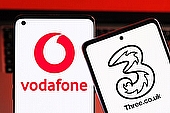Home > Mobile > News > iPhone 12 launches with 5G and four different models
iPhone 12 launches with 5G and four different models
Two of Apple's latest iPhone 12 models will release in the UK on 23 October, with the other two coming on 13 November.
The iPhone 12 is the first generation of Apple iPhones to come with 5G compatibility.
Prices for the iPhone 12 Mini start at £699, while the most expensive iPhone 12 Pro Max passes the £1,000 barrier by starting at £1,099.
No chargers or headphones will be included with these new iPhones as Apple works to cut its carbon emissions.

Range of models
Apple announced the release of four different iPhone 12 models at their virtual event on 13 October 2020:
- iPhone 12 Mini - from £699
- iPhone 12 - from £799
- iPhone 12 Pro - from £999
- iPhone 12 Pro Max - from £1,099
The 12 and the 12 Pro will be available in the UK from 23 October while the 12 Mini and 12 Pro Max will be available from 13 November, although pre-orders may be available at retailers before those dates.
As the name suggests, the 12 Mini is the smallest of the models with a 5.4-inch screen. Both the 12 and 12 Pro have 6.1-inch screens, with the 12 Pro Max screen coming in at 6.7 inches.
Colour options on the 12 and 12 Mini are white, black, blue, green and (Product) Red, while the 12 Pro and 12 Pro Max are available in silver, gold, Graphite and Pacific Blue.
What's new on iPhone 12?
As well as being the first iPhone to have 5G compatibility (more on that below), the 12 range has a few new features to make the iPhones stand out from previous generations.
Here are a few of the headline features:
- A14 Bionic chip, an upgrade on the A13 found in the iPhone 11 range
- Ceramic Shield to improve toughness, offering 4x improved protection against drops according to Apple
- Design is more square edged in a return to the style of the iPhone 4
- MagSafe feature to hold wireless charging pad in right place
- OLED technology instead of LCD offers richer colours and allows the devices to be made thinner
Two things that won't be found in the box with any of the iPhone 12 models, however, are charging cables and wired headphones. Instead, customers will have to buy these separately if they need them.
Apple's justification for this is that not supplying the accessories in the box reduces emissions and improves the carbon footprint of the device.
It's certainly true many customers will already have charging devices and compatible headphones, yet the move may put off new customers who'd have to buy their own external accessories or those upgrading from older models of iPhones with traditional headphone jacks.
5G capability
Apple is a late-comer to the 5G smartphone market, although this tendency to sometimes hold back where others are trying to lead has been a good move on several occasions - see, for example, Samsung's well-publicised issues with their folding device.
Yet 5G services in the UK only launched in May 2019, and expansion has been slow.
So, Apple's move towards 5G in 2020 rather than 2019 means more customers will be able to benefit from the faster speeds now or in the future - or at least they will be content to buy a 5G-capable phone with the expectation 5G will reach them at some point.
Apple aren't the only smartphone manufacturer to wait until 2020 to deliver their first 5G phone - Google announced the Pixel 5 at the beginning of October, along with a 5G-capable update of its Pixel 4a model.
However, the Google Pixel 5 is £100 cheaper than the starting price for the iPhone 12 Mini, costing £599 at launched compared to the £699+ for the Apple device.
Google say this was a deliberate decision based on their expectation of a financial downturn, although Apple's decision to bring out four models of varying capabilities also allows customers to choose the specs that work for them.
Get insider tips and the latest offers in our newsletter

We are independent of all of the products and services we compare.

We order our comparison tables by price or feature and never by referral revenue.

We donate at least 5% of our profits to charity, and we have a climate positive workforce.
Get insider tips and the latest offers in our newsletter









